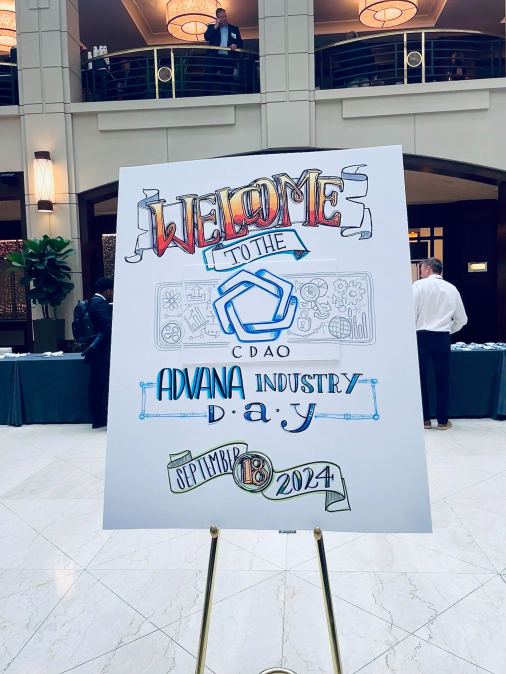CDAO unveils new 10-year, $15B Advana recompete plan — but questions on implementation linger

The Pentagon’s plan for re-competing its maturing and widely used enterprise data and analytics platform — Advana — is designed around funding up to $15 billion in contracts to a diverse range of companies over the next 10 years, Chief Digital and AI Officer Radha Plumb announced on Wednesday at an industry day in Virginia.
There’s still much to unravel and resolve, however, around how the overarching acquisition process will pan out and the number of vendors that might be involved, three senior CDAO officials told DefenseScoop during the event.
“You can’t just plop something this massive down and then just be like, ‘This is our strategy.’ So we’re getting lots of feedback on it,” Garrett Berntsen, the CDAO’s deputy for mission analytics, said.
The word Advana is a mash-up of two others — “Advancing Analytics” — a phrase meant to encompass the Chief Digital and AI Office’s original intent for effort.
Broadly, Advana is a technology platform that houses government-owned data in a flexible federated architecture that enables analytics, data management and data science tools, and associated decision-making support services for the department and military components.
During the industry summit on Wednesday, some of Advana’s key users from around DOD spotlighted real-world impacts of the platform — and particularly amid the Russia-Ukraine war and the U.S. military’s evacuation from Afghanistan. On the sidelines of the open-press portion of the event, three senior CDAO officials briefed the two reporters who joined in on their overarching vision and deliberate intent to garner as much feedback on their plans as possible, directly from potential partners in industry.
“This is us sharing what we think — and how we think we’re aligning or pivoting our acquisition strategy with how the technology is evolving — and trying to either validate or understand, are there lessons learned or best practices [from outside of DOD] that we can adopt in order to make this successful?” Acting Deputy CDAO for Acquisition and Assurance Bonnie Evangelista told DefenseScoop.
Advana’s roots trace back to DOD’s chief financial officer’s unit, when officials needed to pull data from thousands of different business systems that previously weren’t interoperable. But in June 2021, Booz Allen won a five-year, $647 million contract to expand the program.
Implementation and oversight of Advana was one of the main Pentagon elements to be transitioned as a foundational effort within the CDAO when that office became operational in 2022.
In the meeting Wednesday, officials told DefenseScoop that the primary “driver” behind this re-compete opportunity is that the current contract is ending and there can’t be any gaps or degradation in service.
“There’s always other options [when contracts end], but I think the path we’re going down now we believe is going to be most optimal — and part of today is to get some feedback” from industry on that, Evangelista said.
At the same time, those involved also hope to enable more flexibility and competition from a procurement perspective.
“There’s a technical evolution that is opening up the breadth of capabilities within the Advana platform, and so the acquisition approach is now being aligned to match that in a way where we believe we’re growing acquisition capabilities so that contracts can accommodate [contemporary needs]. We know this is an uncertain future in technology, but we’re trying to accommodate as much as we can — so we have 10-year, multiple award [indefinite-delivery, indefinite-quantity] contracts that we are trying to establish for at a value of $15 billion over those 10 years,” Evangelista explained.
Berntsen put it another way: “If you were hypothetically to onboard the only companies on a 10-year vehicle on day one, and never do any additional onboarding, you would only have the companies from 10 years ago. That means right now, OpenAI could not be in this — they didn’t exist six years ago.”
So the overarching construct, he added, “is having a mechanism to onboard companies into this vehicle, performers, and then additional input points for [others, as well as] on-ramps and off-ramps built in.”
Eugene Kuznetsov, deputy CDAO for enterprise platforms and services, told DefenseScoop that the office’s own maturation — paired with growing demands for the platform and Plumb as its new leader — also motivated the re-compete.
“This is sort of the time to take it to the next level of scale in terms of capabilities and bringing out both the platforms and the mission analytics portfolio to sort of the next step of evolution. So it’s a coincidence of factors, but I think certainly the biggest one is just the contract ending, and the need to do that. But also we are ready, and especially with Dr. Plumb’s Open DAGIR vision, you kind of see how this goes to that next step, or next level,” Kuznetsov said.
As a platform, Advana will be foundational for how the CDAO carries out that new Open Data and Applications Government-owned Interoperable Repositories — or Open DAGIR — framework. It marks the office’s latest approach to scaling AI across the services.
The CDAO aims to host more events to engage industry on its strategy for Advana in the near term as it all comes together, and officials also released a new request for information to collect comments on the plan.
Until those responses come in though, there’s still many uncertainties about the Pentagon’s path forward with Advana — and how many contractors could ultimately be involved.
“I think part of today is to help understand what is the right number — if there is a right number,” Evangelista noted.
“One thing we want to really message, or want people to take away from this … is that you don’t have to do everything. So, you don’t have to do every part of the tech stack in Advana. Even if you have a single piece, but you do it really well, you can have one of the IDIQ contracts and have an opportunity to provide support or capability inside the platform. So because of that detail as well, it could significantly expand the number. And we just don’t know what that looks like,” she said.






